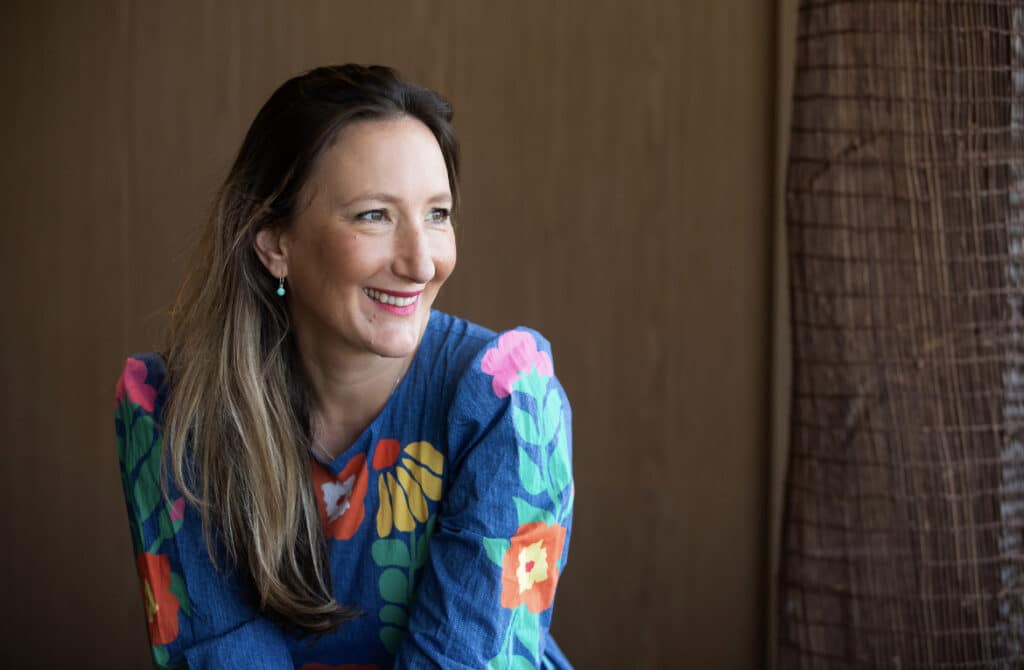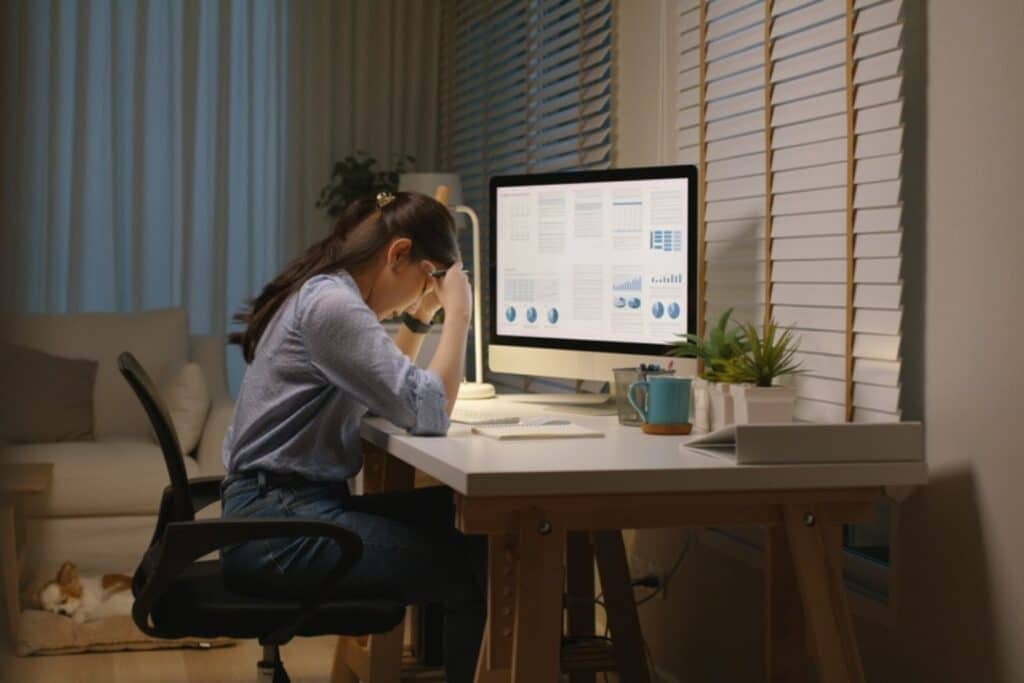When Georgia* was in her 20s, she was ambitious, driven, hard-working and rising quickly in her corporate career.
Now, at 42 years old, she has never been less confident at work.
“The voice in the back of the brain saying ‘are you good enough?’ can really impact you… to be honest, it still carries to this day,” she told Women’s Agenda.
Georgia is a victim-survivor of coercive control, perpetrated by her ex-husband. The experience was traumatic, and the process of separation was long, arduous and extremely difficult for her.
But the whole experience was made even more difficult when she returned back to work. With shaken confidence, Georgia wasn’t performing as well as she normally would at work.
Instead of receiving support and assistance from her employers, however, Georgia was laid off, made redundant and forced to leave workplaces on several different occasions.
“I think it was a complete lack of understanding and knowledge… and it was a very frightening concept (for them) to deal with,” she says.
“No one knew what to do.”
The stats
Family and domestic violence is an epidemic gripping the nation and the globe. The Australian Institute of Health and Welfare (AIWH) estimates one in six women have experienced physical and/or sexual violence by a current or former partner since the age of 15.
However, the spotlight has only recently been put on the impact of emotional and economic intimate partner abuse. According to the AIHW, one in four women have experienced emotional abuse since the age of 15, while one in six have experienced economic abuse. The rate of abuse for women is much higher than for men.
Florence Thum, a psychotherapist and executive coach who works alongside the team at Banksia Academy, says the psychological impacts of family and domestic violence include flashbacks, loss of sense of safety, loss of trust in others, low self-esteem and confidence – just to name a few.
“These cannot be ‘left at home’ when survivors return to work,” Thum says.
“These negatively impact work performance, at a time when work could be a means for financial independence, a sense of normalcy or identity, availability of social network or a copy strategy in the situation.”
A report from the Champions of Change Coalition found 62 per cent of victim-survivors of domestic and family violence are employed, and in any given Australian workplace, almost one in five female employees have experience DFV.
What’s more, according to Monash University, more than 83 per cent of respondents said their experience has directly impacted their job, while one in two victim-survivors said it negatively affected their career progression.
“The challenges or gaps arise from a lack of awareness and training on the impacts of FDV and necessary supportive strategies, the shame and fear of disclosure by survivors who do not feel sufficiently safe, the shame and stigma still persisting in some workplace cultures, and the resource limitations in both the workplace and community to support them,” Thum said.
“There needs to be greater education on what FDV and trauma is in practical terms, and what its impacts are on survivors in the workplace, coupled with management and staff training on maintaining a psychologically safe workplace, and engaging in respectful and compassionate communication.”
Returning to work
No one knows the impact of psychological effects of domestic and family violence on work performance than Georgia.
She was thriving in her corporate career when she met her ex partner. They started living together within 12 months of meeting, and were married within five years.
Whilst they worked together, Georgia never felt it impacted their relationship – especially when it came to pay and promotions.
“I always thought I was in a fairly equitable relationship,” Georgia said. “I thought were were both fairly progressive and it didn’t matter who earned more.
“When we were both working, he was always earning just a little bit more than me, but it was considered mostly equitable and mostly fair.”
Looking back, Georgia now recognises signs of coercive control, even in the better days.
“I always felt he meant to be supportive, but I would find… there would always just be little bits of undermining me,” Georgia said.
“There was always a little bit of coercive control.”
The abuse became more obvious, however, when Georgia, in her mid thirties, started doing well at work after moving to a different division in the company. Meanwhile, his career had hit a bit of a roadblock.
“That’s when I started seeing the disparity,” Georgia said.
Georgia’s husband took up methamphetamine, and the abuse toward her was starting to impact her life, including her work performance.
But Georgia summoned the courage to talk to her boss about what was going on in her home life, hoping to receive some sort of support.
“I was in a position in which I thought I really did trust this leader,” she said.
“It was the first time I’d ever admitted in the workplace that I had a husband at home who was a meth addict. That’s a pretty ‘dirty’ thing.”
Her boss’ response, however, was far from supportive. Georgia was told she could take the time off she needed, but it had to come out of her annual leave. Although she was referred to the Employees Assistance Program (EAP), she felt there were little to no check-ins from management.
The whole response from her workplace, Georgia said, felt like they were ticking a box.
“I think it was a complete lack of understanding and knowledge within it, and it was a very frightening concept to deal with. No one knew what to do,” she said.
“It was family abuse without a black eye. The concept of coercive control is only really starting to become a known concept now.”
When the COVID-19 pandemic hit, Georgia, going through what she was going through at home, was made redundant. She felt part of her employer’s decision to lay her off was because of her experience with coercive control.
“It threw me into an absolutely horrendous depression,” she said.
“I was actually trying to do the right thing by being open and transparent, and it backfired on me pretty horrifically.”
The role of workplaces
Employers play a huge part in ensuring people going through family and domestic violence are safe and supported.
Melanie Greblo, founder of Scriibed and the Banksia Academy, said learning from others’ lived experiences, as well as her own, taught her this.
“There’s a lot of extra needs women have when they’re navigating it all,” she said.
Banksia Academy is a not-for-profit run by Greblo alongside its sister company, Scriibed. The Academy aims to help not just victim-survivors of family and domestic violence return to work, but also to help employers become more empathetic towards the needs to victim-survivors.

“The return-to-work stream is very much about supporting women who have been locked out of the workforce, usually due to their experiences, and we help them transition back into the workforce, but back into higher skilled jobs in the digital economy so that they can actually work towards long term financial independence,” she said.
“We’re also supporting employers to be better equipped in supporting their female and non-binary employees who experience domestic and family violence… to raise their literacy of how to become more aware of domestic and family violence, to recognise it when they might spot it.”
Greblo said people often feel hesitant to tell employers of their situation, fearing no one will listen to them.
“That’s primarily due to the stigma that’s still attached to saying that you’re a victim survivor of domestic and family violence,” she said.
“There’s still the fear that they might not be believed.”
Greblo said employers must be literate and knowledgeable around the impacts of family and domestic violence on employees, and give victim-survivors the time, flexibility and support they need.
“Court hearings in the family court can last up to two weeks… preparing for that can have a really traumatising effect on women, so the flexibility to manage your own hours is definitely the first big thing,” she said.
“What we really need is to create from the inside of these organisations a culture of care and compassion for all humans, but particularly those facing really difficult circumstances like this, so that there’s an opportunity for people to be able to find the language that best reflects what their experiences are.
“We all need to get better at building our literacy around what constitutes coercive control and domestic and family violence.”
Structural change
While employers play a role, Greblo also calls for a broader, structural change in society when it comes to family and domestic violence.
“It’s a hugely complex issue. There’s very sadly not one simple fix – we all wish there was,” she said.
“We need more funding to go into crisis and emergency services for women and frontline services. We need to address the structural barriers that keep women in violent relationships.”
Currently, the world is observing the UN’s 16 Days of Activism to End Gender-based Violence. The campaign began on 25 November, the International Day for the Elimination of Violence against Women and will end on 10 December, Human Rights Day.
This year’s theme is “UNITE! Invest to prevent violence against women and girls” – and that’s exactly what Greblo said needs to happen.
“We need to invest in young children teaching them about respectful relationships. We need to do that to not only prevent violence against women but to prevent violence against children,” she said.
‘It can happen to absolutely anyone’
Coming from a victim-survivor herself, Georgia, who eventually found an employer who supported her through her separation from her ex, has some advice for employers.
“Believe them at their word, don’t ask for a justification. Don’t ask for proof, don’t ask for evidence,” she said.
“Help that person maintain their autonomy, because if they’re coming out of a coercive control situation, they’ve had a loss of autonomy and being told what to feel, think, do – the risk of reactivating some of those things that were always hurting them.
“And allow them to be a little bit difficult to deal with from time to time.”
Georgia still works in the corporate sector, but is currently upskilling to be a psychologist to work in the advocacy space, so she can help other women who are in the position she was once in.
She also has some advice who may be in that place right now.
“Pick your allies well. Recognise that sometimes people won’t have your back, and it’s not out of malice, it’s out of lack of understanding. But you don’t have to justify your position to anyone else either,” she said.
“Being a victim or a victim survivor… it’s not your entire personality. It is a component and you can recover from it.
“Find your support mechanisms, and don’t be afraid that things will get emotionally unbearable. It’s not the worst thing in the world to cry out of exhaustion from the experience.
“And it can happen to absolutely anyone.”
*not her real name
If you are concerned about your behaviour, or about someone using violence, call Men’s Referral Service on 1300 766 491.
If you or someone you know is in need of help due to sexual assault or family and domestic violence contact 1800RESPECT on 1800 737 732
In an emergency call 000.


